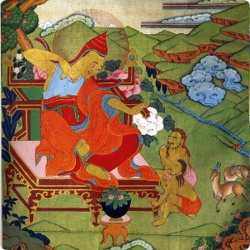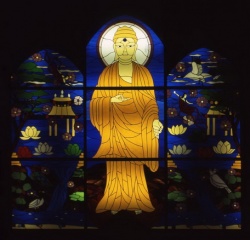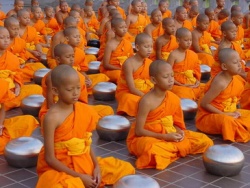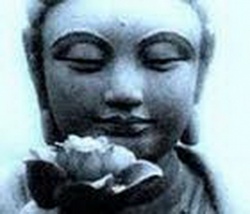The Advantages of Monastic Life
by Lama Yeshe and Lama Zopa Rinpoche
In 1982, Lama Yeshe organized the first Enlightened Experience Celebration, a five-month series of teachings, initiations and retreats held in Bodhgaya and Dharamsala, India. About 100 International Mahayana Institute monks and nuns attended. During the Dharamsala part of the program, Lama Yeshe called the monks and nuns into the gompa at Tushita Retreat Centre and, over two successive evenings (April 17 & 18), gave the following talks.
I want to say a few words to the Western monks and nuns gathered here today. Somehow, we are very fortunate. Trying to live according to Lord Buddha's vinaya rules as best we can, even for a day or a month, we are extremely fortunate. It's good enough. These days the world is degenerating rapidly into impurity, aggression, and the grasping at resources, leading people into a state of tremendous anxiety. Though we are monks and nuns, we cannot ignore what is happening in the world. Newspapers and magazines are full of this information; even so far up here in the mountains, we still feel that negative vibration. Therefore, we have good reason to be proud of our ordination. We should be proud, rather than think, "I'm a monk-I'm so useless, so lonely," "I'm a nun-I'm so useless, so lonely." Instead of repeating that mantra, you should feel proud of what you are.
Also, I'm very satisfied with the way this Dharma Celebration we're holding has gone. When you consider that most 20th century Westerners are living simply to grasp at sense pleasures, it is like a dream that more than 100 Western monks and nuns can come together at an event like this. Remember how His Holiness Ling Rinpoche told us in Bodhgaya that although tourists had been going there for a long time, our gathering was an historic occasion; never before had Westerners come there together to live and practice according to the Buddhist way of life. So we are very, very fortunate. You should be very happy. Living purely by the vinaya rules even for a day is very rare; your doing so is good enough for me.
How and why the IMI started
I'd like to recount a little of the history of the International Mahayana Institute. Some people had doubts when I called this organization the "International Mahayana Institute": they didn't like the name. I don't care! Who cares whether some like it and others don't-that's just the dualistic mind at work. Without an object of hatred, there's no desire. But I came up with this name because the words mean something. The members of our Sangha come from all over the world, so we are truly international; the Buddhism we practice is Mahayana; and since we're an educational phenomenon, I called it an institute: International Mahayana Institute.
Why form such an institute? Why shouldn't our international monks and nuns just go to the mountains and live like Milarepa? Why do we need an organization? Well, take this Dharma Celebration, for example: how many people did it take to organize it? Without organization, how could this Enlightened Experience Celebration have happened? That's my answer. Even two people living together as a couple need to organize their lives. We do need organization. Some hippies reject organization-that is stupid; they don't understand.
They can't organize even their own lives, let alone do something that benefits so many others. So why did I create this institute? Because I felt that according to the vinaya rules, it was my responsibility to do so. Our Sangha members started their Dharma studies with lam-rim; this gave them some understanding of the nature of samsara, the benefits of renunciation, and the best way to practice. Through their own experience they were enthusiastic about getting ordained. So I said yes. But, you know, for me to say yes is easy;
I can ordain anybody any day just by reciting the words of the ordination ceremony, "Blah, blah, blah." But ordaining someone is more than just a day's work. Lord Buddha said that you have to take care of your Sangha. But how do you take care of the Sangha? I'm just a stupid Himalayan monk with neither worldly nor organizational experience. I was never even a manager in Sera Monastery.
I was just a simple monk. All I did was study and serve and cook for my teacher. When I checked out what needed to be done, it appeared difficult for me to take responsibility for what has now become almost 100 monks and nuns. This process led me to conclude that if I created a Sangha community organization, its members would help each other. We need security. We're what Tibetans call "white crows." Tibetans consider that Westerners becoming monks and nuns is as impossible as a crow's being white. As far as society is concerned, we're outcasts. Our pink faces show that we're not part of Tibetan society, and because of our renounced attitude, we're outcasts from Western society as well. They think we're Hare Krishnas.
Not that I'm putting Hare Krishnas down, but people reject us because that's what they think we are. So I felt that we needed the security of creating our own category so that we could exercise our own reality. Therefore, about eight years ago I formed this organization. Since then we've been growing by about five or ten monks and nuns every year. We originally established the organization in Kathmandu, at Kopan, and in my view the monks and nuns who stayed there were successful. They studied lam-rim, they learned some rituals.
But after some time the government changed the visa laws so that it became impossibly expensive for them to stay there. So I thought, well, that's okay; it's no big deal. They are Westerners, not Nepalis; it would be stupid for them to think of spending their entire lives in Nepal, in the Third World. Still, they had renounced the comfort of this life, which is a very good thing. So, I thought deeply about what to do. It took a long time to establish Nalanda, our first Western monastery. It wasn't easy. In the West you have to get involved with dollars. Without money, you can't buy land. Fortunately, one devoted student offered us the property in Lavaur, so finally we now have a place that offers us the opportunity to lead a monastic life and to take care of each other. We do need that.
We have renounced comfort to a certain extent, but we still have our problems; we have not yet eliminated the three poisons. We're not buddhas; we're not arhats. We need to take care of each other emotionally. It's difficult for lay people to do this for us. If monks cry, lay people don't understand: "This monk is supposed to have renounced samsara, now he's crying for it?" But other monks and nuns do understand and can comfort each other, can be warm to each other: "Oh, don't cry. Yes, today's a little cloudy, but it will clear up tomorrow."
There are many differences between lay people and those who are ordained. Their lifestyles are different; their thinking is different; their responsibilities are different. But up until now, just a few of the older monks and nuns have been dedicated to organizing food, clothing, shelter, transport between Nepal and India, and retreat and teaching facilities in order to keep our Sangha community together. Newer monks and nuns can't appreciate how hard we have worked; the old ones know. We have tried our best; we have a long history. We reached a certain point where there were so many of us without income that it was almost impossible to go on. Still, we tried to take care of everybody.
Some Sangha had their own money, and they shared it with others. I was happy to see them doing that. But these days we're scattered all over the world; we don't have our own home, so economically it's difficult to share our limited resources to help each other. In the future, when Nalanda Monastery is more firmly established, I hope that everybody will share in order to help each other. I cannot organize all this myself. I have a vision of what needs to be done, but I can't take a needle and thread and sew all your robes myself; I cannot do all these everyday tasks. You people need to get organized to help each other. This is very necessary. You see, monks and nuns need education. How can we offer them a good education if we don't get organized? You can see how difficult it will be. Anyway, that's a short history of how we started.
What it means to be a monk or nun
Let's talk about how, at the beginning, you should become a monk or nun, or what it means to be a monk or nun. Permitting Westerners to become monks and nuns is not a job to take lightly. Nor is it good to ordain people too easily. We have learned a lot from the experience of the past eight years. First of all, if your parents are still your guardians or if you have a good relationship with them, you need their permission to become a monk or nun. They should be happy about your decision.
This is important; we've had some experience with this. Some people got ordained without their parents' permission, but then later, their negative mind arose. You know, the negative mind, the ego, always likes to rationalize-" Well now, my mother never really liked me being ordained, so I think I'd better give back my robes for her sake." I know. I've had this experience.
I say, "Okay, good." I am not that stupid. If you really want to keep your ordination, who cares what your samsaric mother thinks? Your samsaric mother is stupid, too; full of ignorance, full of desire, full of hatred. Who cares? Lord Buddha himself said that if you are not strong, if you are weak, you need your parents' permission, but if you are totally convinced that what you are doing is right, then you don't. I tell you, our parents are just as stupid as we are. We call our country of birth "the nest of samsara." It's true. I look at my own situation. When I lived in Tibet, my uncle took care of me. Parents mean well, but giving you food, clothes, and money with samsaric mind, worrying about your reputation-I'm sorry, it's not sufficient.
So, what I am saying is, if you are strong enough, you don't need your parents' permission. Shakyamuni Buddha is a good example. Who gave him permission to leave home, to leave his kingdom? Nobody. He had hundreds of wives grasping at him; there's no way they would have given him permission to go lead an ascetic life. Many Westerners want to become monks or nuns simply because, "I hate society; I hate my parents' way of life-there's no alternative, I have to do it. Anyway, it seems that monks and nuns have an easy life, so I think I'll get ordained." That is wrong. Lord Buddha said it's wrong to become a monk or nun just to simplify your life in the sense that you don't have to worry about getting food or clothing or worry about some husband or wife. That is not the connotation of the pratimoksha. Prati means individual; moksha means liberation, or nirvana. It implies that we should understand our own personal samsaric situation and feel dissatisfied with that, not with the external object of society. If this understanding really touches your heart and you become a monk or nun on this basis, your ordination is a truly renounced one.
I tell you, if you become a monk or nun out of bad motivation, you will never succeed. Correct motivation is the most important thing.
Why did you get ordained?
The way you get ordained, though, is good, in that you are old enough to decide for yourselves. Westerners becoming monks and nuns after the age of 20 is better than the way we Tibetans do it. I was just a stupid six-year-old boy when I decided to become a monk. Not so smart; I lost the chance to enjoy many of life's experiences! All of you have seen the sense world, you've had enough male-female relationships, you've experienced most of what worldly life has to offer, and you've reached a certain point where you think, "I want to make my life more easy-going instead of always being in conflict with and hurting others in human relationships." This is actually a better, more Dharma way of getting ordained.
The Tibetan way is sometimes culturally determined. Of course, Tibetan culture has its good aspects and its bad; I can't say Tibetan culture is all good. It also develops the samsaric, egotistical mind. Therefore, it is the responsibility of your preceptor-lama, geshe, yogi, yogini, whoever it is-to ensure that in your heart you have the right motivation for getting ordained. Sometimes people are driven by neurotic, emotional feelings: "Oh, the lam-rim says that renunciation is the best way to practice! Hey, let's go! I want to be just like Milarepa!"
This often happened in Tibet. It was common-many of us were like that. For example, monks from the colleges would go to hear some high lama teach the lam-rim, where he would explain how fantastic Milarepa was, or how Lama Tsong Khapa renounced the world. Many of them would then run off from college and go up into the mountains to lead ascetic lives. But of course, after a few days, most of them would come back down! That's just emotional. Westerners, too, get excited: "Oh, becoming a monk, becoming a nun, what a good idea!" Becoming a monk or nun is not just a good idea! Actually, the life of a monk or nun is quite difficult. Lay people should have compassion for us! It's true! Tibetan lay people have compassion for the Sangha, or at least, they used to– I'm not sure if they still do. Perhaps these days they have given up on monks and nuns. Anyway, just having an emotional feeling is not enough.
Pratimoksha means renounced ordination. Renunciation means that somehow you have the strength to really comprehend that all worldly pleasures, whatever they are, are not for you. If you feel that something totally incompatible with Sangha behavior is actually wonderful, your life as a monk or nun will be very difficult indeed.
If, however, you have a good understanding of the universal samsaric situation, true renunciation will come to you very easily. Therefore, before getting ordained, you should receive perfect, detailed explanations of the nature of samsara and liberation, and what renunciation really means. Attitude makes a big difference-a big difference. When you have a renounced attitude, all your superstitious tendencies are somehow dispelled. Psychologically, having no more expectations makes all the difference. Sometimes I tell people wanting to get ordained to wait for a couple of years.
I think this is good. Live as a monk or nun for a while, and then we can see about ordaining you. Some people have criticized me for this, but what to do? I think it's important for some people to live as monks or nuns for a couple of years without carrying the heavy burden of ordination. Some have done this and after two years have still wanted to become monks and nuns. This is fantastic. There is some significance. I have also told some people to renounce worldly life, wear robes, and live as Sangha. In Tibetan we call this nyam-par nam-sum: live as a monk or nun, listen to the abbot's advice, and don't behave loosely, like lay people do– these three. It is so easy; we have these three simple conditions.
You live like that for a while, until you reach the point where you are sure that this is the way you want to live the rest of your life. Then you can take the actual 36 novice vows. This is an easy way to develop a good understanding of what it's like to be ordained: there's no pressure, you have nothing to lose, it is flexible. I think it's a good idea. In summary, one should not become a monk or nun too easily. Then, when you become ordained, it is very important for you to receive a detailed explanation of the vows.
The relationship with your abbot
What about your relationship with your abbot? According to the vinaya, the person who ordains you becomes your abbot. He becomes responsible for you in the way that a father is responsible for the welfare of his daughter or son; it's that kind of relationship. Do you remember what was explained to you when you were ordained? It's important; it's no joke. As I said before, giving ordination is easy: "Blah, blah, blah. okay, now you're a monk or nun, goodbye!" One hour and it's all over. That's easy. But Lord Buddha said, "No! You have to maintain a strong relationship with your abbot. Whatever important question comes up, I want you to ask him if it's right or wrong." That way you take care of each other.
These days, somehow it's difficult for 20th century monks and nuns to sustain a strong relationship with their abbots. They split with their parents, they split with their gurus, they split with their abbot. some kind of revolutionary lifestyle. Older monks, however, know that being close to their vinaya abbot has great significance, that it really means something, that it is very important. Don't think, "I'm an individualist, I can do what I like." Yes, you can do whatever you like. Nobody's pushing you, but if you make a commitment, if you choose a lifestyle that has certain goals, you need many interdependent phenomena to develop in that direction, to help you reach that point.
Western lifestyle gives you so much freedom, but it also encourages you to develop a strong individualistic ego. So generally, you just do whatever your ego tells you to do. And if you don't do what your ego says, you feel frustrated. We have to change that attitude. When you get ordained, you have to trust that your abbot can give you energy, guide you, help you. You should have confidence that your abbot won't give you bad advice and lead you into some disastrous situation. Therefore, you should build a good connection with your abbot based on the right understanding that he can help you until you are liberated. Do not let your strong individualistic ego rule you; instead, develop a good relationship with your teacher and your Dharma brothers and sisters. They are the resources from which your Dharma wisdom grows.
What to do after you've been ordained
After ordination, you must act according to the vinaya rules as much as you possibly can. That is your responsibility. Getting ordained is easy; it takes less than a day. The difficulty lies in keeping going; that's where the hardships are. You need to study the vinaya rules in detail. For example, as you may remember, the act of killing has four branches: motivation, object, action, and completion. To completely break the vow of killing, all four branches need to be involved. Even if you do something that breaks a vow, if one of these four aspects is missing from the action, you are not completely negative; the vow has been only partially broken. It is important to know these things.
Many times Westerners cry that they've lost their ordination. But when I check up, they haven't lost it. They may have broken something— this is my experience— they may have broken a vow in a small way, but they have not broken it completely. Vows are broken by degrees. You have to study these things clean-clear-then you know how to keep your ordination. Since we are beginners, we sometimes break vows, but there's a way to confess such breaks. There are also degrees of confession and different ways of confessing. Usually we conduct formal confession ceremonies [so-jong] twice a month. It's good to attend those. Participating in so-jong is enough to purify the great accumulation of negativity from having broken precepts.








